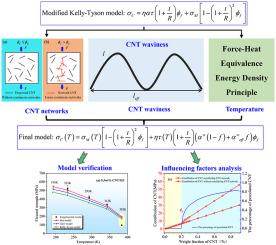Polymer ( IF 4.6 ) Pub Date : 2022-11-15 , DOI: 10.1016/j.polymer.2022.125526 Xuyao Zhang , Weiguo Li , Mengqing Yang , Ziyuan Zhao , Yi He , Shifeng Zheng , Jianzuo Ma , Liming Chen

|
Theoretically determining the tensile strength of CNT/polymer nanocomposites (CPNCs) has long been a huge challenge because it is significantly affected by several influence factors such as CNT networks, waviness, and temperature. In this paper, based on the microscopic characteristics of CNT distributed in the polymer matrix, geometric models of CNT network structures and waviness were presented. Then an analytical model was proposed to forecast the temperature-dependent tensile strength (TDTS) of CPNCs, in which the effects of CNT networks and waviness were considered. The model predicted results agree well with the existing experimental data, and compared with the Kelly-Tyson model and Zare's model, our model has obvious advantages from the aspect of prediction accuracy. Moreover, the quantitative influences of the CNT networks, waviness and temperature on the contributions of CNTs to the tensile strength of CPNCs were systematically carried out. Analytical results can provide some useful guidance on how to select material parameters to obtain CPNCs with a desired tensile strength at different temperatures.
中文翻译:

考虑 CNT 网络和波纹度影响的 CNT/聚合物纳米复合材料的温度依赖性拉伸强度:表征和建模
长期以来,从理论上确定 CNT/聚合物纳米复合材料 (CPNC) 的拉伸强度一直是一个巨大的挑战,因为它受到 CNT 网络、波纹度和温度等几个影响因素的显着影响。本文基于碳纳米管分布在聚合物基体中的微观特征,提出了碳纳米管网络结构和波纹度的几何模型。然后提出了一个分析模型来预测 CPNC 的温度依赖性拉伸强度 (TDTS),其中考虑了 CNT 网络和波纹度的影响。模型预测结果与现有实验数据吻合较好,与Kelly-Tyson模型和Zare模型相比,我们的模型在预测精度方面具有明显优势。此外,CNT 网络的定量影响,系统地研究了波纹度和温度对 CNT 对 CPNC 抗拉强度的影响。分析结果可以为如何选择材料参数以获得在不同温度下具有所需拉伸强度的 CPNC 提供一些有用的指导。



























 京公网安备 11010802027423号
京公网安备 11010802027423号